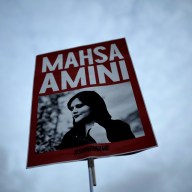 Brie Larson counsels Keith Stanfield in the youth drama “Short Term 12.”
Brie Larson counsels Keith Stanfield in the youth drama “Short Term 12.”
Credit: Cinedigm
‘Short Term 12’
Director: Destin Cretton
Stars: Brie Larson, John Gallagher, Jr.
Rating: R
2 (out of 5) Globes
There’s a lot to admire in “Short Term 12,” a sincere indie about a foster care facility for at-risk kids that looks at it from the perspective of its twentysomething supervisors. The acting, from former teen pop star Brie Larson as a dour, young caretaker on down is excellent without being showoffy. It’s appropriately sensitive and never sentimental about the woes plaguing charges and their superiors alike. Director Destin Cretton, expanding on a 2008 short, takes his time, slowly and methodically filling in a microcosm weighed down with the heaviness of trauma.
It’s also something of a cliche — the exact kind of indie that feigns gritty honesty being far too controlled and, ultimately, far too reassuring. Larson’s Grace is the longtime employee of a facility alongside her live-in boyfriend Mason (a scruffy John Gallagher Jr., “The Newsroom”). She has her own secret demons, and to underline the divide that separates her from her lover — and everyone else — she rides a bicycle by herself everywhere. This is called “subtlety.”
Few of the young charges get significant screentime. Instead the narrative considers two chief cases. There’s Marcus (Keith Stanfield), the only African American — angry and sensitive, who bottles everything up and sometimes erupts in verbal and physical violence. And there’s Jayden (Kaitlyn Dever), whose sarcasm and standoffishness (she doesn’t want to mingle with people she’ll know only briefly) of course masks a horrific secret. Grace sees a lot of herself in Jayden. In fact, she has a similar past, because this is that kind of movie.
“Short Term 12” believes in its cliches and in its predictability, and has a dispassionate tone to almost charm (if that’s the word) its way out of any charges of inauthenticity. It almost gets away with it too. There are times when Cretton’s sincere but tough approach pays off huge, as when Marcus performs a too-revelatory rap for Mason — a scene whose hoariness is upended by the intensity of its shooting and of the actors’ performances. (Mason’s awkward reaction is note-perfect.) Other times it’s too much the poster child for a certain, dubious kind of cinema. It vies for realism and sets up a series of messy situations — and of course, it’s all tidily wrapped up by the too-cute ending.
















